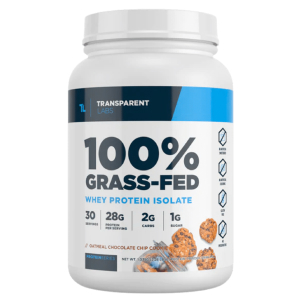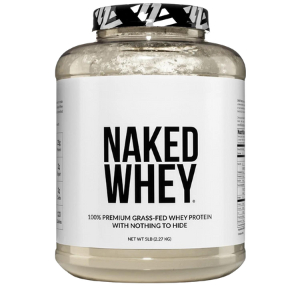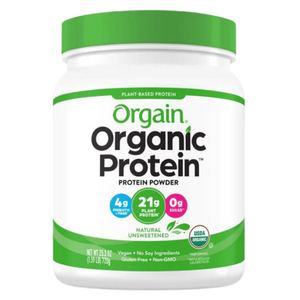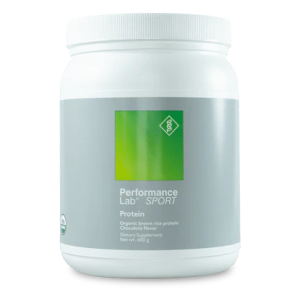Best Low-Calorie Protein Powder 2024: Top 5 Brand Reviews
All articles are produced independently. When you click our links for purchasing products, we earn an affiliate commission. Learn more about how we earn revenue by reading our advertise disclaimer.

Transparent Labs
- 100% grass-fed protein
- 100% whey isolate
- Ideal for muscle growth

Naked Nutrition
- No harmful or heavy metals and substances
- Soy, nuts, and gluten-free
- 100% of grass-fed whey protein powder
15% Off Coupon: HEALTHCANAL

Orgain Organic Protein
- Vegan-friendly
- Artificial additives-free
- The brand offers tasty flavors
Many protein powders on the market today are loaded with sugars and artificial sweeteners that may harm your health. For example, if someone is trying to lose weight and consumes such protein powders, their objective may become unreachable.
Proteins are nutrients that serve as the body’s building blocks, assisting it in various tasks. They’re called building blocks because they provide the body with 20 different essential amino acids that aid in developing, synthesizing, and stimulating the production and function of enzymes, hormones, and cells.
The most important functions of proteins are:
- Growth and maintenance: injury healing[1] and tissue repair.
- The production of key enzymes[2].
- The formation of hormones[3]: amines, steroids, proteins, and peptides.
- Boosts the immunity: antibodies and immunoglobulins[4].
- Provide the body’s tissues and cells with structure[5]: elastin, collagen, and keratin.
- Maintain proper body pH[6].
- Proteins help regulate body fluid[7] content.
- May provide the body energy[8].
- They help in the transportation[9] of nutrients: vitamins, minerals, cholesterol[10], oxygen, and sugar.
This article examines five of the best low-calorie protein powder brands.
Best Low-Calorie Protein Powder For Weight Loss In (April. 2024)
- Transparent Labs Protein Powder – Best Grass-Fed Whey Protein Isolate Powder
- Orgain Organic Plant-Based Protein Powder – Best Vegan Low-Calorie Pea Protein Powder
- Naked Nutrition Whey 100% Grass-Fed Protein – Best Grass-Fed Whey Protein Powder
- Optimum Nutrition Platinum HydroWhey – Best Low-carb Hydrolyzed Whey Isolate
- Performance Lab SPORT Protein Powder – Editor’s choice
Who Should Use Low-Calorie Protein Powder?
Everyone indeed requires proteins for various reasons. However, when it comes to supplementation, groups of individuals need it more than others. A healthy adult may acquire the recommended daily allowance supply of high-quality protein from protein foods.
Nevertheless, the following groups benefit significantly from the supplementation of a low-calorie or a zero-carb protein powder:
- People who follow a calorie-restricted diet
- Dieters who follow a keto diet
- People who want to build muscle
People Following A Calorie-Restricted Diet
If you’re watching your weight and you do not want to keep counting the calories in your protein shake, you need low-calorie protein powder. Getting the most protein for the least calories provides leeway in your nutrition.
Protein is also crucial because it is the most satisfying calorie supply and helps you avoid cravings helping you stick to a healthy weight.
Dieters Who Follow A Keto Diet
The keto diet is a popular weight-loss approach that involves eating a high-protein diet with fewer calories. It’s an advanced strategy that supports muscle growth while shedding fat quickly.
When every calorie counts, a pure protein powder can be extremely beneficial. You want protein intake without the carbs when you’re on a ketogenic diet. Since low-calorie, high-protein powders tend to cut carbs, particularly sugars, the best low-calorie protein powder is ideal for keto dieters.
People Who Want To Build Muscle
Weight lifters, gym-goers, and athletes could benefit significantly by using low-calorie protein powders. When you undertake strength training, consuming high-quality protein helps you retain your muscle mass and stimulates muscle development.
Low-calorie protein powders are better than typical protein powders since it strips the need of one having to count the calories they consume daily. So, in essence, it makes supplementation easier. What is better is that most are easy to make. Mix with the beverage of your choice to create tasty low-calorie protein shakes and have them on the go!
5 Best Low-Calorie Protein Powder For Weight Loss In 2024
Transparent Labs Protein Powder
This low-calorie whey protein combination is 100% pure whey protein isolate, and the protein powder is 100% grass-fed, meaning it comes from cows that have been fed only pasture. That means no hormones, steroids, or chemicals are present in the product.
- Ideal for muscle growth and healing after training
- 00% grass-fed whey isolate protein powder
- A fast-absorbing protein blend
- May cause weight gain
100% grass-fed whey protein isolate has more protein at 28g per serving and a significant BCAA(Branched-chain amino acids) content.
The following ingredients are found in this whey isolate:
Isoleucine
Suppose your end objective is muscle building and rehabilitation. In that case, isoleucine[12] is the third of the “big 3” of the nine essential amino acids that must be present in high amounts in your whey protein powder.
Leucine
This BCAA occurs organically in significant proportions in Transparent Labs Protein due to the cleanliness of the protein powder blend. Another advantage of using whey protein isolate over other protein sources is that it naturally contains high concentrations of Leucine. It may be beneficial for muscle protein synthesis[13].
Valine
Valine is one of the most effective branched-chain amino acids (BCAAs). It’s been demonstrated to improve athletic performance[14] and stamina. It is also potent in reducing muscle soreness and fatigue.
Its ability to aid muscular development and healing makes it a beneficial component, and Transparent Labs Protein contains a lot.
Whey Protein Isolate
Whey protein isolate[15] is the primary protein source that has gone through the Cross-flow Micro-filtration technique, which removes all of the filler elements, drastically reduces fat content, and cleanses the protein thoroughly.
As a result, the protein powder is extremely clean, purified, fast-digesting, and easy to assimilate. Furthermore, the whey protein isolate is entirely grass-fed, making it even more pure and reliable. Whey protein from non-grass-fed cows could contain chemicals or other hazardous substances provided to the animals.
Naked Nutrition Whey 100% Grass-Fed Protein
The moniker Naked Nutrition came from the company’s goal to utilize as few ingredients as possible. As a result, they call their items “naked.” Their grass-fed whey protein powder is no exception, and it’s a great choice for a grass-fed protein supplement that’s unflavored.
- No harmful or heavy metals and substances
- Soy, nuts, and gluten-free
- 100% of grass-fed whey protein powder
- May help with muscle building
- May offer users better muscle recovery
- A few clients attest it does not mix well with water
- Unflavoured, which some people may find unpleasant
NAKED 100% Grass-Fed Whey Protein Powder is among the cleanest kinds of protein powder in the industry, with no additives, artificial sweeteners, or GMO components. They use the cold process, which eliminates the risk of contamination. As a result, customers receive just the highest nutritional benefits.
While the powder is unflavored, combining it with a couple of your favorite fruits and ice creates a delicious protein shake that will keep you energized during your workout.
This low-calorie protein powder packs a good 25 grams of protein per serving. This protein blend helps athletes and users build muscle and heal faster from challenging workouts.
Orgain Organic Plant-Based Protein Powder
According to the makers, the protein shake powder is perfect for mixing with water or milk after an exercise or while you’re on the move during your busy day. As the manufacturers also claim, it’s suitable for the whole family, including children.
- Available in tasty flavors like chocolate, peanut butter, cookies, and cream
- Free from any synthetic additives
- Non-GMO, kosher, and gluten-free
- Vegan-friendly
- A bit expensive
Pea, chia seeds, and brown rice protein, are used to make the one-pound container of vegan protein powder. It’s vegan, kosher, dairy-free, gluten-free, lactose-free, soy-free, non-GMO, and devoid of synthetic additives, with 150 calories per serving. It also has 7g of fiber per serving and only 3 net carbohydrates.
Monk fruit, stevia, and erythritol are the three sweeteners used by Orgain. The powder’s protein shakes are popular because it’s creamier, it blends better, and has a higher iron content than some other vegan protein powders.
According to Orgain, the protein powder should be mixed with almond milk or water.
Optimum Nutrition Platinum HydroWhey
Conveniently packaged into packs, this multivitamin The Optimum Nutrition Hydro Whey is a 100% hydrolyzed whey isolate, making it the finest type of whey protein available.
- Contains 87% protein per calorie
- 100% hydrolyzed whey protein
- Great brand reputation
- Affordable whey protein
- You can mix with both water and milk without clamping
- Tasty chocolate flavor
- Has added digestive enzymes
- Contain low volumes of vitamins and minerals
- Contains artificial sweeteners and flavors
Protein in Platinum Hydro Whey is 39-gram per serving, with only 3 grams of net carbohydrates and 1 g of fat.
Branched-chain amino acids, BCAAs, including L-isoleucine, L-Leucine, and L-Valine, have been incorporated into the whey protein.
A combination of digestive enzymes, including Amylase[16], Aminogen[17], Protease[18], Lipase, and Lactase[19], is also included. Lactase is generally added to aid the breakdown of the lactose component of whey. However, there ought to be minimal to no lactose content in hydrolyzed whey. All the same, digestive enzymes are a great addition to whey protein.
Cocoa is combined with organic and artificial flavors to create an irresistible chocolate flavor. As an additional flavoring agent, salt is also used. Because this food contains almost no fat, a creamer is needed to help give a creamy mouthfeel. Potassium Chloride[20] is the only mineral supplement they’ve included. Potassium is quickly eliminated when you sweat during activity. Potassium serves as an electrolyte in your body and is essential for normal muscle function.
Performance Lab SPORT Protein Powder
Performance Lab Sport Protein is a vegetarian whole-grain rice protein supplement that helps people perform better working out and in their daily lives.
- All dietary preferences are catered
- Clean, organically approved, and plant-based
- Effective at boosting lean muscle mass
- Delicious
- An expensive low-carb protein powder
Unlike most protein plant-based sources, Oryzatein® is a complete family of proteins with enough proportions of all nine essential amino acids[11] required in the human diet. For a regular meal of 30g, two scoops of the powder contain 20g of protein, ideal for consumption.
Organic cocoa, Ceylon cinnamon, vanilla, organic yacon root, stevia, and monk fruit, are used to naturally flavor and sweeten the product.
Artificial dyes, preservatives, tastes, and sugars are not used. This low-calorie protein powder is entirely non-GMO, gluten-free, and caffeine-free.
Benefits Of Using Low-Calorie Protein Powder
Here are some reasons why low-calorie protein powders are beneficial:
Protein Is A Hunger Suppressant
Protein’s hunger suppression[21] property is a fantastic advantage for someone trying to maintain or lose some weight. Protein is perhaps the most satiating of all essential nutrients, so you’ll get the same amount of energy without feeling hungry. You can remain full and cut down on binge eating on a weight-loss plan.
A protein powder with a low-calorie count gives you the feeling of fullness you want minus the calories. Instead of snacking, this will help you stick to a strict diet. It’s a huge benefit because consistency is so important for maintaining healthy habits.
Burning More Fat Requires Fewer Calories
It happens because a substantial calorie deficiency may be created and maintained. Naturally, the body burns the stored body fat to compensate for the discrepancy.
The finest low-calorie powders will typically contain about 50 calories less than most protein powders. It can result in a monthly weight gain of slightly about 230 grams which may seem insignificant, but it adds up quickly – especially if you have a couple of low-calorie protein shakes each day.
Protein Helps You Lose Weight
A high-protein diet has been shown in studies[22] to help people lose weight. A larger protein intake will aid you in achieving your fitness goals. Reduced appetite, greater nutritional portioning, and how your body absorbs proteins are all factors.
The essential point is that diets with high protein sources appear to be more effective than the market’s standard option weight loss supplements.
What Makes The Best Low-Calorie Protein Powder?
There are a couple of factors that can help you choose a low-calorie protein powder, and they are as follows:
Protein Per Calorie
Any food could be labeled as a diet product by lowering the servings or protein level. However, while this might save calories, it would provide little real advantage.
That is why protein per calorie is a more accurate indicator. A higher proportion indicates a superior product since you’ll get all the advantages without calories. Nonetheless, please remember that in one gram of proteins, you get 4 calories.
The Additional Ingredients In The Protein Combination
Check the protein powder’s additional beneficial ingredients, exotic flavors, improved assimilation, or extra intriguing information.
Characteristics like a complete amino acid profile and the absence of excess sugar, gluten, and other allergens are other great ways to indicate the quality of a low-calorie protein powder.
The factor applies to both the positive and the negative: anything that improves a product will majorly make a low-calorie protein powder the best.
The Supplement’s Worth
Supplement businesses frequently raise the prices of their diet foods, and any protein blend sold is no exception. As a result, for low-calorie protein powders, value is critical as you don’t want to overpay for a less effective product.
So to get the most out of a low-calorie protein powder, ensure that you get suggestions from a physician who has established your individual needs.
How To Choose Low-Calorie High Protein Powder?
There are numerous protein powders available, but you may consider selecting the best low-calorie protein powder based on the following factors
The ideal supplement ensures that you get the best possible outcome when you want to gain weight, lose weight, muscle mass growth, or improve overall health.
The Type Of Protein Included
There are various types of proteins depending on the protein sources. The two broad types you will find are plant proteins and animal proteins. Plant protein is sourced from organic plants, and animal proteins are sourced from animals.
Examples of plant protein powders are
- Hemp protein.
- Organic brown rice protein.
- Sunflower lecithin seeds proteins.
- Pumpkin seed proteins.
- Pea protein powders.
And animal protein powders are collagen protein powders, whey protein powders, casein protein powder, and egg white protein powders.
These types are classified further into concentrates, isolates, and protein blends. You need to consider these important factors, especially if you observe a strict diet. So much so, if you are on a vegan diet, then an organic plant-based protein powder would be ideal. If not, then a whey protein concentrate powder would work for you.
Brand Reputation
A Brand reputation search is significant in selecting the best protein powder. If a brand has a good reputation, then it means that it cares about its client and ensures that they benefit from its products. Since most of the reputation is based on client satisfaction, they are a good brand to consider when they have a good image.
Most importantly, check the brand’s standing with head regulatory organizations like the Food and Drug Authority (FDA). Check if they have any warning letters or have any active lawsuits. If they have a clean record, they are certainly doing something right, offering the best protein powders to their clients.
Third-party Testing
After considering the brand’s reputation, check if they have any publicly available third-party testing results of their low-calorie protein powder. Such testing gives you peace of mind as you get confirmation that whatever they have listed on their label is what you are getting.
It also seals the deal that the supplement could offer you the required daily requirement of proteins when you make a protein shake as a meal replacement.
Tied to this, check for additional certifications like the Current Good Manufacturing Practice (cGMP) or (National Science Foundation) NSF-sport certificates to further ascertain that the substance is clean and potent.
Final Thought
Most protein powders offer the body numerous benefits like immunity boosting, body fluid, and pH balancing. For this reason, people use whey protein concentrates and isolate protein powders for weight loss, muscle building, and energy supply.
The five brands above are among the best in the market. However, you can also look at others like a brand called Isopure Zero Carb Protein, a no-calorie protein powder.
Before using a vegetable pea protein isolate or a casein protein low-carb protein shake powder, ensure that you get a medical examination and advice to reap the full benefits of the protein powders. Don’t forget the brand reputation, ingredient profile, and third-party testing.
Frequently Asked Questions
The best protein sources for losing weight are organic protein from foods, casein, and whey protein powder supplements with low-calorie content.
Sneezing, throat inflammation, flushing skin, stomach ache with cramping, explosive diarrhea, and chest tightness are all common side effects of protein shakes.
There are 4 calories in one gram of protein.
Because of the ability to help with appetite suppression, low-calorie protein powders can help with faster weight loss.
This depends on the brand, but generally, the calorie per serving ranges between 100 and 150 grams.
If the foods you blend with the low-calorie protein powder are calorie-rich, you may gain weight. However, if they are also low-calorie foods, you will not gain weight
+ 22 sources
Health Canal avoids using tertiary references. We have strict sourcing guidelines and rely on peer-reviewed studies, academic researches from medical associations and institutions. To ensure the accuracy of articles in Health Canal, you can read more about the editorial process here
- Yeung (2017). Protein intakes are associated with reduced length of stay: a comparison between Enhanced Recovery After Surgery (ERAS) and conventional care after elective colorectal surgery. The American journal of clinical nutrition, [online] 106(1). Available at: https://pubmed.ncbi.nlm.nih.gov/28468890/.
- Cooper, G.M. (2022). The Central Role of Enzymes as Biological Catalysts. [online] Nih.gov. Available at: https://www.ncbi.nlm.nih.gov/books/NBK9921/.
- Nussey, S. and Whitehead, S. (2022). Principles of endocrinology. [online] Nih.gov. Available at: https://www.ncbi.nlm.nih.gov/books/NBK20/.
- Li, P., Yin, Y.-L., Li, D., Woo Kim, S. and Wu, G. (2007). Amino acids and immune function. British Journal of Nutrition, [online] 98(2), pp.237–252. Available at: https://pubmed.ncbi.nlm.nih.gov/17403271/.
- Berg, J.M., Tymoczko, J.L. and Lubert Stryer (2009). Protein Structure and Function. [online] Nih.gov. Available at: https://www.ncbi.nlm.nih.gov/books/NBK21177/.
- Hamm, L.L., Nakhoul, N. and Hering-Smith, K.S. (2015). Acid-Base Homeostasis. Clinical Journal of the American Society of Nephrology, [online] 10(12), pp.2232–2242. Available at: https://www.ncbi.nlm.nih.gov/pmc/articles/PMC4670772/.
- Busher, J.T. (2022). Serum Albumin and Globulin. [online] Nih.gov. Available at: https://www.ncbi.nlm.nih.gov/books/NBK204/.
- Berg, J.M., Tymoczko, J.L. and Lubert Stryer (2019). Food Intake and Starvation Induce Metabolic Changes. [online] Nih.gov. Available at: https://www.ncbi.nlm.nih.gov/books/NBK22414/.
- Diallinas, G. (2014). Understanding transporter specificity and the discrete appearance of channel-like gating domains in transporters. Frontiers in Pharmacology, [online] 5. Available at: https://www.ncbi.nlm.nih.gov/pmc/articles/PMC4162363/.
- Levy, E., Spahis, S., Sinnett, D., Peretti, N., Maupas-Schwalm, F., Delvin, E., Lambert, M. and Lavoie, M.-A. (2007). Intestinal cholesterol transport proteins: an update and beyond. Current Opinion in Lipidology, [online] 18(3), pp.310–318. Available at: https://pubmed.ncbi.nlm.nih.gov/17495606/.
- Medlineplus.gov. (2017). Amino acids: MedlinePlus Medical Encyclopedia. [online] Available at: https://medlineplus.gov/ency/article/002222.htm.
- Wolfe, R.R. (2017). Branched-chain amino acids and muscle protein synthesis in humans: myth or reality? Journal of the International Society of Sports Nutrition, [online] 14(1). Available at: https://www.ncbi.nlm.nih.gov/pmc/articles/PMC5568273/.
- Garlick, P.J. (2005). The Role of Leucine in the Regulation of Protein Metabolism. The Journal of Nutrition, [online] 135(6), pp.1553S1556S. Available at: https://pubmed.ncbi.nlm.nih.gov/15930468/#:~:text=Studies%20both%20in%20vivo%20and,as%20well%20as%20in%20liver.
- Bioscience, Biotechnology, and Biochemistry. (2018). Acute supplementation of valine reduces fatigue during swimming exercise in rats. [online] Available at: https://www.tandfonline.com/doi/full/10.1080/09168451.2018.1438168.
- Duarte, N.M., Cruz, A.L., Silva, D.C. and Cruz, G.M. (2020). Intake of whey isolate supplement and muscle mass gains in young healthy adults when combined with resistance training: a blinded randomized clinical trial (pilot study). The Journal of Sports Medicine and Physical Fitness, [online] 60(1). Available at: https://pubmed.ncbi.nlm.nih.gov/31565912/.
- Ololade Akinfemiwa and Thiruvengadam Muniraj (2021). Amylase. [online] Nih.gov. Available at: https://www.ncbi.nlm.nih.gov/books/NBK557738/.
- Anderson, M.L. (2011). A Double-Blind Clinical Study to Investigate the Effects of a Fungal Protease Enzyme System on Metabolic, Hepato-renal, and Cardiovascular Parameters Following 30 Days of Supplementation in Active, Healthy Men. Food Digestion, [online] 4(1), pp.19–25. Available at: https://www.ncbi.nlm.nih.gov/pmc/articles/PMC3644185/.
- Craik, Charles S., Page, Michael J. and Madison, Edwin L. (2011). Proteases as therapeutics. Biochemical Journal, [online] 435(1), pp.1–16. Available at: https://www.ncbi.nlm.nih.gov/pmc/articles/PMC4503466/.
- Romero-Velarde, E., Delgado-Franco, D., García-Gutiérrez, M., Gurrola-Díaz, C., Larrosa-Haro, A., Montijo-Barrios, E., Muskiet, F.A.J., Vargas-Guerrero, B. and Geurts, J. (2019). The Importance of Lactose in the Human Diet: Outcomes of a Mexican Consensus Meeting. Nutrients, [online] 11(11), p.2737. Available at: https://www.ncbi.nlm.nih.gov/pmc/articles/PMC6893676/.
- Weaver, C.M. (2013). Potassium and Health. Advances in Nutrition, [online] 4(3), pp.368S377S. Available at: https://www.ncbi.nlm.nih.gov/pmc/articles/PMC3650509/.
- Harvard Health. (2018). Extra protein at breakfast helps control hunger – Harvard Health. [online] Available at: https://www.health.harvard.edu/staying-healthy/extra-protein-at-breakfast-helps-control-hunger.
- Moon, J. and Koh, G. (2020). Clinical Evidence and Mechanisms of High-Protein Diet-Induced Weight Loss. Journal of Obesity & Metabolic Syndrome, [online] 29(3), pp.166–173. Available at: https://www.ncbi.nlm.nih.gov/pmc/articles/PMC7539343/.





